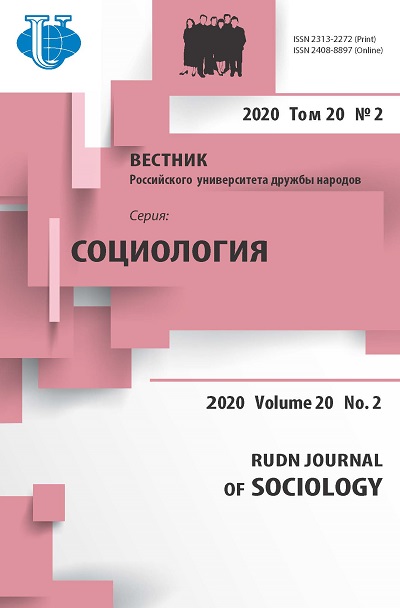Religiosity of the urban community in Kazakhstan
- Authors: Alimbekova G.T.1, Shabdenova A.B.2, Lifanova T.Y.2
-
Affiliations:
- Center for the Study of Public Opinion
- Al-Farabi Kazakh National University
- Issue: Vol 20, No 2 (2020)
- Pages: 323-332
- Section: Contemporary society: the urgent issues and prospects for development
- URL: https://journals.rudn.ru/sociology/article/view/23873
- DOI: https://doi.org/10.22363/2313-2272-2020-20-2-323-332
Cite item
Full Text
Abstract
Religious values as the most important component of the worldview can significantly affect various aspects of human life - from everyday practices to political preferences. The analysis of changes in religiosity shows that in the post-Soviet space, there is a clear tendency of the transition from atheistic attitudes to the religious revival. In the contemporary Kazakhstan society, a complex model of religious identity develops - it combines ideals and norms of religious consciousness with ideas of spirituality and national revival, but the confession values can often only be of an external, declarative nature. According to different studies, in Kazakhstan, the share of believers following religious practices increases. The question is whether people really observe religious rites and traditions and follow religious regulations. The article summarizes the results of the study conducted by the Center for the Study of Public Opinion to assess the religiosity of the Almaty urban community. The survey showed that the share of people who identify themselves as a part of some confession is significant; however, this is not a direct indicator of the increase in the number of true believers seeking to actively follow all religious rules and practices. The article presents the data on the activity of respondents in religious practices, their knowledge and understanding of some religious postulates. The study showed that the religious renaissance among the youth can be accompanied by undeveloped religious consciousness and insufficient religious knowledge, which provides grounds for the dissemination of pseudo-religious ideas including the extremist ones.
Keywords
About the authors
G. T. Alimbekova
Center for the Study of Public Opinion
Author for correspondence.
Email: welcome@ciom.kz
кандидат социологических наук, директор
Zhibek Zholy St., 54, Almaty, 050002, KazakhstanA. B. Shabdenova
Al-Farabi Kazakh National University
Email: aija2005@mail.ru
преподватель кафедры социологии и социальной работы
Prosp. Al-Farabi, 71, Almaty, 050040, KazakhstanT. Yu. Lifanova
Al-Farabi Kazakh National University
Email: philosophy-sociology@mail.ru
кандидат философских наук, доцент кафедры философии
Prosp. Al-Farabi, 71, Almaty, 050040, KazakhstanReferences
- Abercrombie N., Hill S., Turner B.S. Sociologichesky slovar [Dictionary of Sociology], Moscow; 2004 (In Russ.).
- Burova E.E. Trendy novoj religioznosti v sovremennom Kazahstane (opyt sociogumanitarnogo izmereniya) [Trends of New Religiosity in Contemporary Kazakhstan (the social-humanitarian dimension)]. Almaty; 2014 (In Russ.).
- Vasilieva E.N. “Kult” i “sekta”: problema razgranicheniya [‘Cult’ and ‘sect’: The problem of differentiation]. Religiovedenie. 2007; 3 (In Russ.).
- Ignatiev A. Pyat bazovyh kontseptov sociologii religii [Five basic concepts of sociology of religion]. Sotsiologicheskoe Obozrenie. 2014; 1 (In Russ.).
- Kaariajnen K., Furman D.E. Starye tserkvi, novye veruyushchie: Religiya v massovom soznanii postsovetskoj Rossii [Old Churches, New Bbelievers: Religion in the Mass Consciousness of Post-Soviet Russia]. Saint Petersburg; 2000 (In Russ.).
- Kalilakhanova K.T., Konstitutsiya — osnova svetskosti kazahstanskogo gosudarstva [Constitution as the basis of secularism in Kazakhstan]. https://www.zakon.kz/4649756-konstitucija-osnova-svetskosti.html (In Russ.).
- Mukhamedzhanova B., Ibraev E., Utemisov Zh. Gosudarstvenno-konfessionalnye otnosheniya v Respublike Kazakhstan [State-confessional relations in the Republic of Kazakhstan]. Astana; 2015 (In Russ.).
- Nelson L.D. Sekulyarizatsiya i socialnaya integratsiya v sopostavitelnom aspekte [Secularization and social integration in the comparative perspective]. Sotsialnye Problemy Zarubezhnyh Stran. 1992; 5 (In Russ.).
- Narbut N.P., Trotsuk I.V. Sotsialnoe samochuvstvie molodezhi postsotsialisticheskih stran (na primere Rossii, Kazakhstana i Chekhii): sravnitelny analiz tsennostnyh oriyentatsiy (Chast 1) [The social well-being of the post-socialist countries’ youth (on the example of Russia, Kazakhstan and Czech Republic): Comparative analysis of value orientations (Part 1)]. RUDN Journal of Sociology. 2018; 18 (1) (In Russ.).
- Narbut N.P., Trotsuk I.V. Sotsialnoe samochuvstvie molodezhi postsotsialisticheskih stran (na primere Rossii, Kazakhstana i Chekhii): sravnitelny analiz strakhov, nadezhd i opaseniy (Chast 2) [The social well-being of the post-socialist countries’ youth (on the example of Russia, Kazakhstan and Czech Republic): Comparative analysis of fears and hopes (Part 2)]. RUDN Journal of Sociology. 2018; 18 (2) (In Russ.).
- Centre for the Study of Public Opinion, Almaty, Kazakhstan. http://www.ciom.kz.
- Shabdenova A.B., Alimbekova G.T. Uroven religioznosti semey s razlichnym statusom: rezultaty sotsiologicheskogo issledovaniya [The level of religiosity of families with different status: Results of the sociological research]. KazNU Bulletin. Psychology and Sociology Series. 2016; 4 (In Russ.).
- Altmaier E.M. Religiousness and spirituality. Promoting Positive Processes After Trauma. Academic Press; 2019.
- Cox H.G. Religion in a Secular City: Essays in Honour of Harvey Cox. Trinity Press; 2001.
- Heiler F., Montgomery W. The Spirit of Worship. New York; 2013.
- Luckmann Th. Die Unsichtbare Religion. Frankfurt am Main; 1996.
- Saliba J.A. New religious movements in sociological perspective. Understanding New Religious Movements. California; 2004.
- Schwadel P. Cross-national variation in the social origins and religious consequences of religious non-affiliation. Social Science Research. 2018; 70.
- Shabdenova A.B., Verevkin A.V. Single parents in transformation: A social research. Teorija in Praksa. 2018; 3.
- Tillich P. Christianity and the Encounter of World Religions. Minneapolis; 1994.
- Weber M. Essays in Sociology. New York; 1946.
Supplementary files
There are no supplementary files to display.














